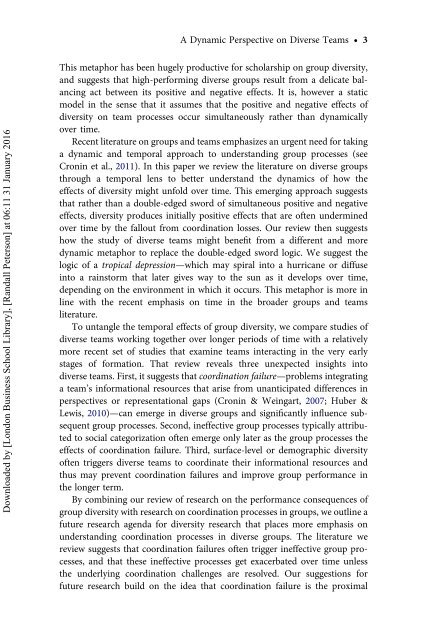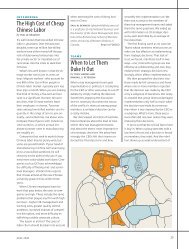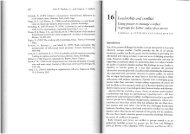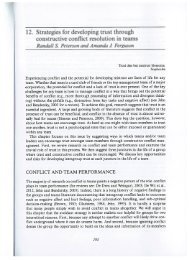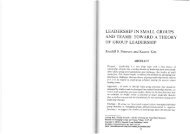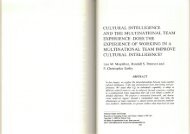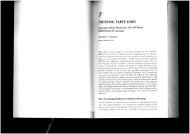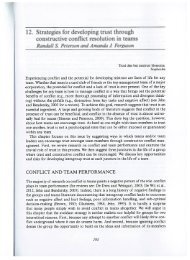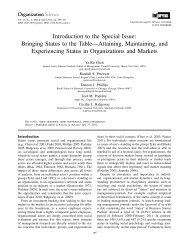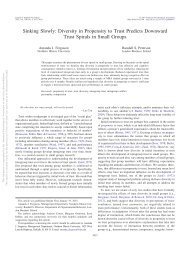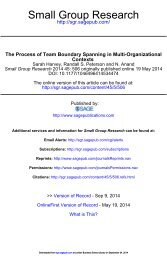A Dynamic Perspective on Diverse Teams: Moving From The Dual Process Model to A Dynamic Coordination-Based Model of Diverse Team Performance - Kannan Srikanth, Sarah Harvey & Randall Peterson
The existing literature on diverse teams suggests that diversity is both helpful to teams in making more information available and encouraging creativity and damaging to teams in reducing cohesion and information sharing. Thus the extant literature suggests that diversity within teams is a double-edged sword that leads to both positive and negative effects simultaneously.
The existing literature on diverse teams suggests that diversity is both helpful to teams in making more information available and encouraging creativity and
damaging to teams in reducing cohesion and information sharing. Thus the
extant literature suggests that diversity within teams is a double-edged sword
that leads to both positive and negative effects simultaneously.
Create successful ePaper yourself
Turn your PDF publications into a flip-book with our unique Google optimized e-Paper software.
A <str<strong>on</strong>g>Dynamic</str<strong>on</strong>g> <str<strong>on</strong>g>Perspective</str<strong>on</strong>g> <strong>on</strong> <strong>Diverse</strong> <strong><strong>Team</strong>s</strong> † 3<br />
Downloaded by [L<strong>on</strong>d<strong>on</strong> Business School Library], [<strong>Randall</strong> Peters<strong>on</strong>] at 06:11 31 January 2016<br />
This metaphor has been hugely productive for scholarship <strong>on</strong> group diversity,<br />
and suggests that high-performing diverse groups result from a delicate balancing<br />
act between its positive and negative effects. It is, however a static<br />
model in the sense that it assumes that the positive and negative effects <strong>of</strong><br />
diversity <strong>on</strong> team processes occur simultaneously rather than dynamically<br />
over time.<br />
Recent literature <strong>on</strong> groups and teams emphasizes an urgent need for taking<br />
a dynamic and temporal approach <strong>to</strong> understanding group processes (see<br />
Cr<strong>on</strong>in et al., 2011). In this paper we review the literature <strong>on</strong> diverse groups<br />
through a temporal lens <strong>to</strong> better understand the dynamics <strong>of</strong> how the<br />
effects <strong>of</strong> diversity might unfold over time. This emerging approach suggests<br />
that rather than a double-edged sword <strong>of</strong> simultaneous positive and negative<br />
effects, diversity produces initially positive effects that are <strong>of</strong>ten undermined<br />
over time by the fallout from coordinati<strong>on</strong> losses. Our review then suggests<br />
how the study <strong>of</strong> diverse teams might benefit from a different and more<br />
dynamic metaphor <strong>to</strong> replace the double-edged sword logic. We suggest the<br />
logic <strong>of</strong> a tropical depressi<strong>on</strong>—which may spiral in<strong>to</strong> a hurricane or diffuse<br />
in<strong>to</strong> a rains<strong>to</strong>rm that later gives way <strong>to</strong> the sun as it develops over time,<br />
depending <strong>on</strong> the envir<strong>on</strong>ment in which it occurs. This metaphor is more in<br />
line with the recent emphasis <strong>on</strong> time in the broader groups and teams<br />
literature.<br />
To untangle the temporal effects <strong>of</strong> group diversity, we compare studies <strong>of</strong><br />
diverse teams working <strong>to</strong>gether over l<strong>on</strong>ger periods <strong>of</strong> time with a relatively<br />
more recent set <strong>of</strong> studies that examine teams interacting in the very early<br />
stages <strong>of</strong> formati<strong>on</strong>. That review reveals three unexpected insights in<strong>to</strong><br />
diverse teams. First, it suggests that coordinati<strong>on</strong> failure—problems integrating<br />
a team’s informati<strong>on</strong>al resources that arise from unanticipated differences in<br />
perspectives or representati<strong>on</strong>al gaps (Cr<strong>on</strong>in & Weingart, 2007; Huber &<br />
Lewis, 2010)—can emerge in diverse groups and significantly influence subsequent<br />
group processes. Sec<strong>on</strong>d, ineffective group processes typically attributed<br />
<strong>to</strong> social categorizati<strong>on</strong> <strong>of</strong>ten emerge <strong>on</strong>ly later as the group processes the<br />
effects <strong>of</strong> coordinati<strong>on</strong> failure. Third, surface-level or demographic diversity<br />
<strong>of</strong>ten triggers diverse teams <strong>to</strong> coordinate their informati<strong>on</strong>al resources and<br />
thus may prevent coordinati<strong>on</strong> failures and improve group performance in<br />
the l<strong>on</strong>ger term.<br />
By combining our review <strong>of</strong> research <strong>on</strong> the performance c<strong>on</strong>sequences <strong>of</strong><br />
group diversity with research <strong>on</strong> coordinati<strong>on</strong> processes in groups, we outline a<br />
future research agenda for diversity research that places more emphasis <strong>on</strong><br />
understanding coordinati<strong>on</strong> processes in diverse groups. <strong>The</strong> literature we<br />
review suggests that coordinati<strong>on</strong> failures <strong>of</strong>ten trigger ineffective group processes,<br />
and that these ineffective processes get exacerbated over time unless<br />
the underlying coordinati<strong>on</strong> challenges are resolved. Our suggesti<strong>on</strong>s for<br />
future research build <strong>on</strong> the idea that coordinati<strong>on</strong> failure is the proximal


